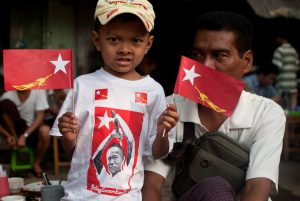The partial unofficial results of the United States elections were reported on November 8, which was also the same day Myanmar held its general election. Many Filipinos closely monitored the reelection bid of President Donald Trump, which they believe could serve as a guide on how to challenge the party of by President Rodrigo Duterte at the country’s next presidential election in 2022. Meanwhile, only a few bothered to comment about the significance of the Myanmar polls and how the continued dominance of the ruling National League for Democracy (NLD) could offer concrete lessons for the Philippines. There is a lot to say about the notorious populism of Trump and Duterte but the reelection of the NLD is a timely reminder that a government which has received international condemnation for human rights abuses can still tap popular domestic support in order to cling to power.
In November 2015, the NLD clinched a historic landslide victory, sparking hope that it would consolidate Myanmar’s democratic transition after decades of being under military rule. The same high expectations greeted Duterte when he won a convincing victory in 2016, despite the long odds he faced initially as a candidate.
Both the NLD and Duterte would later face accusations of committing or abetting horrific human rights abuses in their countries. The NLD-led government has been accused of genocide at the International Court of Justice for its treatment of the country’s Muslim Rohingya community; a probe is also underway at the International Criminal Court. The Duterte government was held accountable by various global institutions, including the U.N. Human Rights Council, for the bloody legacy of its so-called “war on drugs.”
Yet, the NLD went on to dominate the 2020 elections, confirming that it still enjoys the trust of a significant majority of the local population. Its international credibility might have suffered in recent years because of its human rights record – but apparently this didn’t matter much to most voters.
For those seeking to defeat Duterte and his allies in 2022, the NLD is proof that stinging criticism from the international community does not automatically translate into fewer votes. This realization should prompt opposition forces in the Philippines to work harder to shift public opinion and expand their electoral base. This is an immense challenge given that Duterte currently boasts an approval rating north of 90 percent.
As the incumbent party during the campaign period, the NLD had the advantage of being more visible to the electorate. The government cited the coronavirus pandemic to restrict campaign activities and prevent mass assemblies that could potentially sway more votes for candidates. This set-up favored government officials and those with adequate resources to get better media exposure.
This type of limited campaigning could also be adopted in the Philippines if the pandemic continues in 2021 and early 2022. The implication is that only members of the ruling party will be allowed to move around and visit communities to deliver services or even the COVID-19 vaccine should this become widely available next year. Other political parties should start thinking of innovative ways to reach out to voters if the government enforces similarly strict health protocols to Myanmar’s government.
At the same time, Myanmar’s success in holding an election during a pandemic, and even at a time when new COVID-19 cases were surging, should be used as a reference point in rejecting any suggestion that the Philippines’ 2022 election should be postponed. Myanmar showed that voting is possible while observing social distancing and implementing safety measures in polling places.
A month before election day, Myanmar’s election body announced the cancellation of voting in dozens of conflict zones, a controversial decision which disenfranchised more than a million mostly ethnic minority voters. There were questions about the impartiality of this order because it focused on the strongholds of ethnic-based parties that were likely to challenge the NLD. It is unlikely that a similar order would be adopted in the Philippines, given the country’s experience in administering elections in conflict zones. Nonetheless, this should serve as a lesson for the Philippines to start implementing initiatives for the resumption of its stalled peace process with communist rebels, or to ensure that the conflict will not intensify and justify the postponement of voting in some villages.
Conflict can also affect the voting process in other ways. Myanmar has cited security concerns as justification for the throttling of 3G internet services in parts of Rakhine and Chin states. It also ordered the blocking of websites accused of spreading “falsehoods” about the military. That this could happen too in the Philippines is not far-fetched, given the recent passage of the Anti-Terror Law and the shutdown of the country’s biggest media network. The new law gives the authorities the power to arbitrarily censor information and pursue critics.
Myanmar’s political context is obviously different from the Philippines. An NLD victory does not necessarily mark a reverse of the country’s democratic transition, given that it represented another embarrassing defeat for the military-backed party. Nevertheless, Myanmar’s recent electoral experience provides several crucial lessons for both ruling and opposition parties in the Philippines, which they can apply in the run-up for the 2022 elections.

































